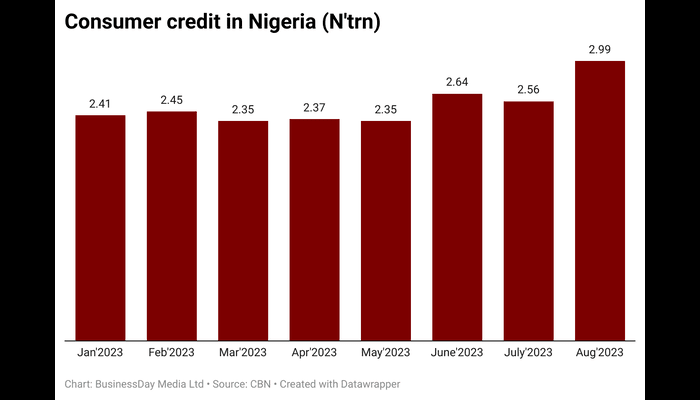The demand for loans by shoppers in Nigeria has risen to the very best in practically 4 years in August largely on the again of rising inflationary pressures.
Newest knowledge from the Central Financial institution of Nigeria (CBN) present that client credit score rose by 16.9 p.c to N2.99 trillion in August from N2.56 trillion within the earlier month. It additionally rose year-on-year by 23.1 p.c from N2.43 trillion in August final 12 months.
“The rise in client credit might be attributed to elevated demand for credit score services by financial brokers,” the CBN stated within the report.
A breakdown of knowledge reveals that non-public loans recorded the very best share of 75.4 p.c, whereas the share of retail loans stood at 24.6 p.c.
“When inflation is rising however development in earnings or financial actions is abysmal, one ought to count on this type of pattern the place shoppers would resort to credit to cowl the shortfalls in a bid to fulfill their important consumption,” Temitope Omosuyi, funding technique supervisor at Afrinvest Restricted, stated.
He added that the powerful enterprise atmosphere dealt an enormous blow to the job market, making extra folks both unemployed or not in a position to negotiate for the next wage to match the rising worth degree
“The Nationwide Bureau of Statistics (NBS) reported that meals accounts for greater than 50 p.c of complete family expenditure. Sadly, rising meals costs are the most important stress level. Therefore, the binge on credit score for survival,” he stated.
Okafor Tochukwu, a senior lecturer at Baze College, stated many households had been beneath stress because the budgets they initially had weren’t in a position to meet the financial necessities of their day by day lives, making them begin taking private credit score to fulfill their obligations.
“Sadly, in an period the place there may be inflation and constant consumption, inflation is certain to proceed growing,” he added.
Inflation, which serves as a measure of client costs, has greater than doubled during the last eight years, worsening the residing circumstances of cash-strapped shoppers in Africa’s largest financial system.
The Tinubu administration’s reforms together with the elimination of petrol subsidy and naira devaluation, applied within the second quarter of the 12 months, pushed the inflation charge to the very best degree in 18 years.
In accordance with the NBS, the common retail worth paid by shoppers for petrol in Might was N238.1, however elevated by 172.5 p.c to N648.9 in November. The typical retail worth of diesel additionally rose from N844.28 per litre to N1,055.6 per litre.
The rise in the price of petrol pushed up the common fare paid by commuters for bus journeys throughout the metropolis per drop to N1,047.6 in November from N649.6 in Might.
The naira depreciated from 416.52/$1 as of February 28, 2022 to N854.61/$ on December 20 on the official market. On the parallel market, popularly known as the black market, the greenback was quoted to N1,225 from N575.
“Sadly, the inflation pressures persevered after the elimination of gas subsidy and the liberalisation of the international alternate market as the price of home goods, transportation, and housing continues to be on the rise,” Nuale Graham, a Lagos-based funding analyst, stated.
She famous that attributable to these pressures, individuals are compelled to search for options to fulfill their important necessities. “Thus, people and households have began taking over credit score to assist cushion the impression of rising prices and mitigate in opposition to their dwindling buying energy.”
The headline inflation charge rose to twenty-eight.20 p.c in November, the identical as in August 2005, from 27.33 p.c in October, in accordance with NBS.
Meals inflation charge, which constitutes greater than 50 p.c of headline inflation, was 32.84 p.c in November, in comparison with 24.13 p.c a 12 months earlier.
A current report by SBM intelligence, titled ‘Residing Dangerously on Credit score’, stated Nigerians spend 97 p.c of their month-to-month earnings on meals.
“A state of affairs the place folks spend greater than their month-to-month earnings on meals could sign that they’ve resorted to credit score or taken on extra work to feed their households,” the report stated.
It added that deposit cash banks and microfinance banks (together with mortgage apps) had been the most important strains of credit score for respondents, which indicators that Nigerians have adopted these establishments as their lifeline once they hit exhausting instances.
The World Financial institution revealed in its newest Nigeria Growth Replace report that rising inflation elevated the variety of poor folks to 104 million in 2023 from 89.8 million firstly of the 12 months.
This suggests that an extra 14.2 million folks fell into poverty from January to November 2023.
“The impression of this inflation is very exhausting on the poor and weak. The federal government has initiated focused money transfers to mitigate among the impression on probably the most weak households,” the report stated.
The World Financial institution stated a holistic method to lowering inflation, together with by way of tighter fiscal and financial insurance policies can be wanted.
Omosuyi of Afrinvest Restricted famous that the rising client credit score will proceed if Nigeria’s financial system doesn’t flip the nook on inflation and employment.
“In the meantime, credit score suppliers should take note of defaults, as rising credit score amidst a poor macro atmosphere will definitely result in a excessive delinquency charge.”


